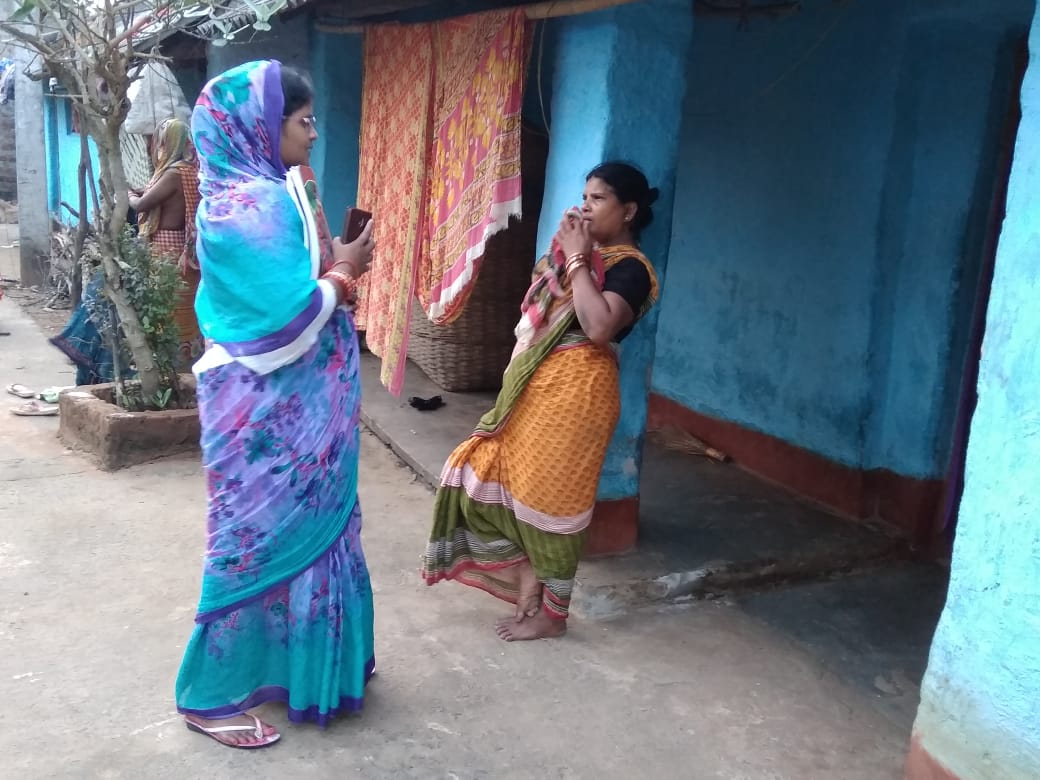Simlisahi’s women rally their community for the right to safe sanitation
StoryBy Chandrika Patnaik, Rahul Thekdi
12 August 2020
Bilasini Jena draws strength from her personal adversities, rallies other women and becomes a local community advocate to ensure access to and adoption of safe sanitation in her village Simlisahi in Odisha.

Bilasini motivating women in her community to construct toilets and bathing rooms.
Photograph by Debasis Sahoo
For the women of Simlisahi village from the Nayagarh district of Odisha, the daily trek to a nearby hill for defecating and fetching water was an excruciating ordeal. It’s now a thing of the past, thanks to the safe sanitation drive initiated by Bilasini Jena, a member of the local self-help group. Simlisahi is finally free from the scourge of open defecation.
Bilasini remembers the painful experience of the past. Her father-in-law and mother-in-law could barely walk due to old age. Every day, she would carry them to the bushes far away from her house to relieve themselves. None of the households in Simlisahi village had toilets and bathing rooms (TBRs) in their homes. It meant a trek to the base of a nearby hill and using thickets to relieve oneself.
For the women and young girls, it also meant compromising on their health and safety, day in, and day out. In addition, the absence of regular water access forced the women to use ash or mud for cleaning themselves after defecation. This daily trial was a fatiguing and undignified experience for them.
Ranjan Kumar Behera, a member of the VDC, recounted the ordeal of how during monsoons the village drains would get filled with human faeces. The heavy rains would make the accumulated dump on hillside flow downward towards Simlisahi and make it a sickeningly stinking place. Ranjan shuddered while describing the roads of Simlisahi filled with rancid excreta during the monsoon, preventing villagers from stepping out of their homes.
Desperate to find a solution, Bilasini approached the Village Development Committee (VDC) and spoke passionately about the safe sanitation needs of the women in Simlisahi. A group formed by Bilasini started weekly meetings to discuss the matter, which soon galvanised everyone into a movement for safe sanitation.
The group relentlessly carried door-to-door campaigns to drive home the point of adopting safe sanitation practices. The initiative gathered momentum when in 2018 , Gram Vikas with support from HDFC Parivartan (a CSR arm of HDFC bank) began activities under the Holistic Rural Development Programme (HRDP) project in Simlisahi.
The collective efforts of women fructified when all 170 households of Simlisahi finally had TBRs and piped water in their homes. The construction of TBRs brought significant relief to the villagers and started a new chapter of sanitation in Simlisahi. Since then, the newly formed Village Water and Sanitation Committee (VWSC) has been responsible for maintaining and governing the sanitation infrastructure in the village.
The VWSC, with support from the local self help groups, collects a fee from all households for the maintenance and upkeep of sanitation facilities. Gram Vikas has provided training and sensitised women on the interrelated issues of gender, hygiene and sanitation.
Bilasini is grateful to other women for standing with her in the entire struggle. She credits Gram Vikas for helping them to realise the vision of open defecation free Simlisahi. With TBRs at home, Bilasini saves her time-consuming long walks to the hill and spends more time at home. She is also relieved that children of Simlisahi do not have to go outside for defecation anymore.
Shantilata Dey, a thirty-six year old woman from Simlisahi echoes Bilasini’s sentiments. She wants to forget her daily trek to the hill in the past to relieve herself. With piped water in place, Shantilata is even spared the tiresome walks, many times in a day, to fetch water from the borewell.
Kashinath Nahaka, a VWSC member, is full of praise for the women of Simlisahi, especially Bilasini’s leadership, as they encouraged the community to embrace safe sanitation practices. He is unequivocal in admitting the importance of TBRs inside homes as they ensure dignity for women. Kashinath thanked Gram Vikas for the support in constructing sanitation facilities and uplifting Simlisahi from the morass of open defecation.
Street plays conducted to raise awareness on sanitation and hygiene issues.
Photograph by Prashant Naik
ACKNOWLEDGEMENT
Prashant Naik collected field data for the story. Priya Pillai edited the story.
ABOUT THE AUTHOR
Chandrika Patnaik is a Junior Manager, and Rahul Thekdi is a Communications Intern at Gram Vikas.
RELATED BLOGPOSTS
Turning losses into gains: How Mallipanka farmers find success in new crops
Reviving agriculture: Mallipanka’s first strawberry farm story.
Ensuring dignity beyond life: supporting migrant families in their darkest hours
Gram Vikas ensures safe migration and dignified repatriation for deceased migrant workers, supporting bereaved families.
Collective leadership transforms ageing overhead water tank to secure household water supply for all
Kalakhadi’s aging overhead tank revived through collective leadership, ensuring sustainable water supply for the community.